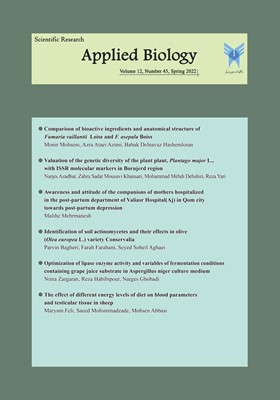Awareness and attitude of the companions
of mothers hospitalized in the post-partum department of Valiasr Hospital(Aj) in
Qom city towards post-partum depression
Subject Areas :
biology
Malihe Mehrmanesh
1
1 - Instructor, Department of Midwifery, Qom Branch, Islamic Azad University, Qom, Iran
Received: 2021-08-18
Accepted : 2021-10-12
Published : 2022-03-21
Keywords:
Family,
Valiasr Hospital(AJ) Qom,
Childbirth,
pregnancy,
Depression,
mother,
Abstract :
Objective: Postpartum depression may have irreparable consequences for the mother, child and her family. The awareness and attitude of family members plays a very important role in early diagnosis and treatment of the disease as quickly as possible. Therefore, this research was conducted with the aim of determining the level of awareness and attitude of the companions of mothers hospitalized in the post-partum department of Valiasr(Aj) Hospital, Qom.Materials and methods: This cross-sectional descriptive study was conducted on 100 companions of mothers hospitalized in the post-partum department of Valiasr Hospital(Aj) Qom, using available sampling method. The data collection tool was a three-part questionnaire including personal information, awareness and attitude measurement. The data were analyzed with the help of descriptive and inferential tests by SPSS version 16 software.Findings: The results showed that 70% of the studied people had moderate knowledge about postpartum depression. There is a statistically significant relationship between the level of awareness of postpartum depression with the variables of age, level of education, spouse's education, number of pregnancies, occupation and type of delivery. 85% of people had a negative attitude towards postpartum depression. The relationship between education level, spouse's education, number of pregnancies and occupation, with attitude was statistically significant. But the relationship between attitude with age and type of delivery was not statistically significant.Conclusion: Considering the importance of family members in supporting and diagnosing postpartum depression as quickly as possible, it is necessary to increase the awareness and attitude of those around pregnant mothers with different educational methods.
References:
Cunningham F. Obstetrics, 25th (ed.). Mc Graw-HilL Education. 2018. (In Persian)
Rabiei L. Understanding the factors of affecting postpartum depression in the mothers of Isfahan city. J Health Syst RES. 2014; 10(1): 11-20. (In Persian)
Salehi Kesai P. A Comparative study of the prevalence of postpartum depression in two groups of mothers with natural delivery and cesarean section [dissertation]. Tehran: Tehran School of Nursing and Midwifery. 2013. (In Persian)
Behboudi Moghadam Z, Sadr SS & Doulatian M. Prevalence of postpartum depression and factors affecting it in Tehran. Journal of medical council of I.R.I. 2004; 22: 189-193. (In Persian)
Veisani Y & Sayehmiri K. Prevalence of postpartum Depression in Iran-ASystematic Review and metaAnalysis. The Iranian Journal of obstetrics, Gynecology and Infertility. 2012; 15(14): 21-29. (In Persian)
Beckmann C. Obstetrics and gynecology. 7th (ed.). Philadelphia: Lippincott wiliams & Wilkins; 2013: 397.
Highet N, Gemmill AW & Milgrom J. Depression in the perinatal period: awareness, attitudes and knowledge in the Australian population. Aust. N. Z. J. Psychiatry. 2011; 45: 223-231.
Mirsalimi F, Ghofranipour F, Montazeri A & Noroozi A. Postpartum depression literacy among pregnant women. 2019; 18(5): 525-533. (In Persian)
Poreddi V & et al. Knowledge and attitudes of family members towards postpartum depression. Archives of Psychiatric Nursing. 2020; 34(6): 492-496.
Branquinho M, Canavarro M & Fonseca A. Knowledge and attitudes about postpartum depression in the potuguese general population. Midwifery. 2019; 77: 86-94.
_||_
Cunningham F. Obstetrics, 25th (ed.). Mc Graw-HilL Education. 2018. (In Persian)
Rabiei L. Understanding the factors of affecting postpartum depression in the mothers of Isfahan city. J Health Syst RES. 2014; 10(1): 11-20. (In Persian)
Salehi Kesai P. A Comparative study of the prevalence of postpartum depression in two groups of mothers with natural delivery and cesarean section [dissertation]. Tehran: Tehran School of Nursing and Midwifery. 2013. (In Persian)
Behboudi Moghadam Z, Sadr SS & Doulatian M. Prevalence of postpartum depression and factors affecting it in Tehran. Journal of medical council of I.R.I. 2004; 22: 189-193. (In Persian)
Veisani Y & Sayehmiri K. Prevalence of postpartum Depression in Iran-ASystematic Review and metaAnalysis. The Iranian Journal of obstetrics, Gynecology and Infertility. 2012; 15(14): 21-29. (In Persian)
Beckmann C. Obstetrics and gynecology. 7th (ed.). Philadelphia: Lippincott wiliams & Wilkins; 2013: 397.
Highet N, Gemmill AW & Milgrom J. Depression in the perinatal period: awareness, attitudes and knowledge in the Australian population. Aust. N. Z. J. Psychiatry. 2011; 45: 223-231.
Mirsalimi F, Ghofranipour F, Montazeri A & Noroozi A. Postpartum depression literacy among pregnant women. 2019; 18(5): 525-533. (In Persian)
Poreddi V & et al. Knowledge and attitudes of family members towards postpartum depression. Archives of Psychiatric Nursing. 2020; 34(6): 492-496.
Branquinho M, Canavarro M & Fonseca A. Knowledge and attitudes about postpartum depression in the potuguese general population. Midwifery. 2019; 77: 86-94.


